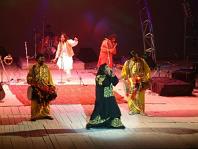
Download Recently two suicide bombers carried out a deadly attack on a Sufi shrine in the eastern Pakistani city of Lahore.
There are some elements among Islamist extremists, including the Taliban, who believe that worshipping at the shrines of saints is un-Islamic.
But despite growing threats Sufism and its mystical elements are gaining popularity amongst the young.
Naeem Sahoutara joins the young fans at a performance of folksingers presenting fusion Sufi songs in Karachi.
Folksinger Arif Lohar performs with pop singer Meesha Shafi in front of a packed crowd.
Boys and girls wearing jeans and fancy armbands move their bodies slowly to the beat of the song.
The lyrics are ‘Long life my beloved master, who planted this jasmine in my heart.’
23-year-old Marvi Aslam is one of the fans in the audience.
“In the present era of materialism, the Sufi mystic bears a lot of importance. We have hectic life. I think, the classical, slow and calm music gives you mental peace. When you listen to it, you feel yourself encouraged and relaxed. It’s like a meditation. So, mystic music is something spiritual. It connects you, the singer with the God. You feel like in the world of fantasies, somewhere else not here. When you listen, you just feel apart for a moment or two from this world.”
A percussion instrument called Chimta and a single-cord guitar-like instrument Iktara are being played with electronic guitars.
Once popular among elders, remixed versions of spiritual songs, like this one, are a hit with the young.
Another fan is 16-year-old Noorus Saba.
“People are fond of music, they go to the shrines, they like music there. The mystic music is there for hundreds of years. This is not a new thing, shrines are not new, but the militants are.”
But some religious groups are against mysticism and mystic music.
Mufti Muhammad Naeem is a noted scholar belonging to the Ehl-e-Sunnat Bralevi sect.
He says mystic songs violate Sharia laws.
“Sufism is being misinterpreted in different countries and cities. The sanctity of Sufis shrines is being disgraced in such a way that the women are visiting there, music is being played. Today, the concept of Sufism has changed. I went to visit America, where songs and music was being played in the name of Sufism. The prophet Muhammad (PBUH) has forbidden all this. We are against all what is being done at the shrines.”
18-year-old Abdul Aziz, a seminary student agrees that listening to Qawwali is prohibited in Islam.
“Listening to music is outlawed in the religion. According to a Hadith, once the holy Prophet Muhammad (PBUH) and His disciples were passing through some place, where drums were being beaten. The Prophet put his hand on his ears and also asked the disciples to follow Him. The music and Qawwali is outlawed.”
There is a growing trend among militants to target members of other sects as well as minorities.
At the shrine of Sufi Saint Abdullah Shah Ghazi devotees are being frisked by security personnel.
Due to fears about attacks Sufi music is now performed inside instead of out in the open.
Riaz Ahmed is the Assistant Manager at the shrine. He says there is no religious justification for attacks on shrines.
“Those elements involved in such tragedies have nothing to do with the religion. Those, who oppose mysticism, are deaf people. Today, we proudly claim ourselves to be as Muslims. All this is due to services of the Saints for spread of Islam. The history itself speaks. I think, they are the torch bearers of Islam.”
Some devotees go into ecstasy when they hear mystic music.
Shrine caretaker Riaz says the music creates a spiritual connection between man and his God.
“I think, one forgets himself while listening to mystic music. One feels himself out of his control. One is cut off from this world. His heart, his mind, his eyes turn towards his God. One forgets about his surroundings. These are the feelings.”
The government condemns terrorist’s attacks at the shrines.
Syed Hamid Saeed Kazmi, the Federal Minister for Religious Affairs, says innocent seminary students are being mislead.
“Obviously, some misled and misguided persons are involved in such acts of terrorism at shrines. They don’t have the knowledge of Qura’an and Hadith. Neither they know the orders of the Allah and holy Prophet, nor know the spirit of Islam. The innocent children, who are narrow-minded, go to Madressas, where they are being trapped in the name of Jihad and used for such activities.”
However, the educated generation is getting inspired by Sufism.
23-year-old singer Omer Sher is fond of mystical songs. He says he has given up singing pop songs.
“Sufi music inspires me. Sufi music got locked on me. You can say, I don’t feel like doing other genre of music, I had been doing rock and pop music. But, I ended up in Sufi music, because I feel it, I enjoy doing it. And at the end of the day, I’m giving out a message to the audience. Pop music is all about fake realities of life. One sings broken heart or hat trick songs. Sufi music is about ultimate reality of life. That’s the difference between pop and Sufi music."
Teenager Noorus Saba supports Sufi music because it’s non-violent.
“Main purpose of mystic music was for peace, not for terrorism and extremism. Because the cause is good, we support it irrespective of whether it is against the religion or not!”
While the hardliners and militants strongly resist the mystical form of the Islam, Pakistani youth are becoming addicted to Sufi songs.












